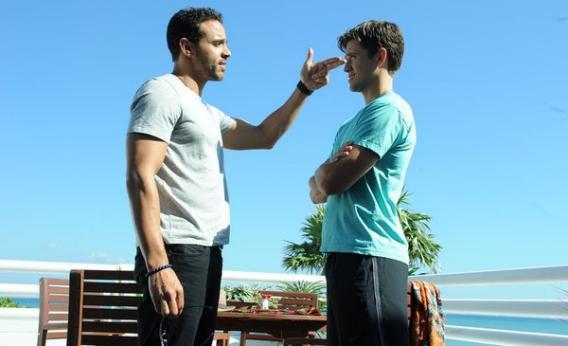If you’ve read anything about Graceland, the new “undercover agents in Southern California” series than premieres on USA tonight, you’ll know that it’s “darker” and edgier than the network’s usual blue-sky fare. To which I say: nonsense.
Sure, Graceland is darker than, say, Psych or Royal Pains, but that’s like saying that ecru is darker than ivory. Graceland is edgier than White Collar or Necessary Roughness, but only in the way that the letter G is edgier than the letter C. There are lots of good reasons to watch Graceland, but a craving for grit and grim realness isn’t one of them.
Graceland begins with Mike Warren (played with boy-scout charm by Broadway’s Aaron Tveit) graduating at the top of his class at the FBI Academy. That distinction should earn him the right to choose his own posting, but instead of starting his career in D.C., he’s dispatched to a swank beachfront property in Southern California, where FBI agents share digs with DEA and Customs operatives. Mike’s new undercover colleagues are polar opposites of the button-down image of federal agents, which means Mike is a cardigan-wearing, no-flip-flops-owning dweeb in a sea of cool surf dudes and dames.
And that, of course, is the ultimate USA set-up. The network’s formula has long been “beautiful person with extraordinary skills is isolated in a sunny/glamorous locale and forced to rely on a secret-keeping friend/family member/co-worker, while trying to solve the problem that’s restricting his movements, doing good along the way.” In recent years, the network has allowed a few clouds to darken the heavens—throwing some crimps into the Neal-Peter bromance in White Collar (created by Jeff Eastin, who is also responsible for Graceland), making Annie Walker’s life miserable in Covert Affairs—but that feels like a carefully calibrated strategy: Into each life some rain must fall, and into each USA show a little conflict must creep.
Graceland is apparently based on a true story of undercover agents living in a luxurious home seized from a drug dealer—and it’s that cohabitation that sets the show apart. The five other agents who share Mike’s deluxe digs—Daniel Sunjata as his boss Paul Briggs, Vanessa Ferlito as Charlie Lopez, Brandon Jay McLaren as Dale Jakes, Manny Montana as Johnny Tuturro, and Serinda Swan as Paige Arkin (she arrives a few episodes into the season)—are interesting in their own right, and they all have to get along. Graceland is about what happens when six strangers live in a house and work together, when people stop being polite and start getting real.
Writing is often USA shows’ Achilles’ heel, and while Graceland’s early episodes are saddled with some “let me state the theme” dialogue about undercover work (such as “your lies are your life”), the story lines—which involve drug cartels, illicit arms dealers, Russian gangs, and exotic-bird smugglers—at least make sense. (I’m a sucker for the USA formula, but it doesn’t pay to try to figure out the twists in a typical episode of White Collar or Royal Pains—they seldom hold up to scrutiny.) But USA’s greatest gift is for casting.
There’s real talent in this roster of actors, and they’re provided with lots of opportunities to interact in situations when drug runners aren’t pointing guns at them and illegal arms deals aren’t going down. They bicker over chores and bond over spaghetti dinners; they surf together and drink beers around a beach fire. Does that sound dark to you?
